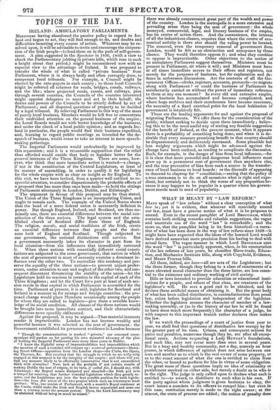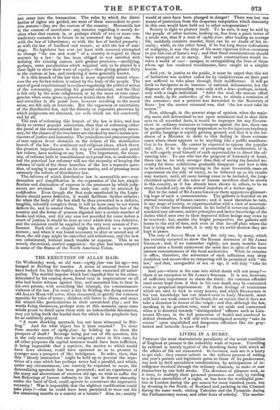WHAT IS MEANT BY " LAW REFORM."
MART speak of "law reform" without a clear conception of what law is ; yet it is evident, that whoever will materially amend our law, must have a precise notion of what it is he proposes to amend. Even in the recent pamphlet of Lord BROUGHAM, which contains both striking remarks and valuable suggestions, the vague and uncertain use of the word " law " is remarkable ; and the more so, that the pamphlet being in its form historical—a narra- tive of what has been done in the way of law reform since 1828—it might have been expected that the ideas of the learned Lord would have derived somewhat more precision from his having to deal with actual facts. The vague manner in which Lord BROUGHAM uses the word " law " is particularly apparent, when, in his enumeration of the law reforms of late years, he classifies Slave-trade, Educa- tion, and Mechanics Institute bills, along with Copyhold, Evidence, and Mesne Process bills.
All these, indeed, are laws—all are acts of the Legislature; but the three former, though they belong to a class of enactments of a more elevated moral character than the three latter, are less essen- tial to the existence and ordinary working of civil society.
Bills or laws intended to provide education or educational insti- tutions for a people, and others of that class, are creatures of the legislator's will. He sees a good end to be obtained, and he devises these artificial means of obtaining it. But the great body of what has been called distributive, in contradistinction from penal law, exists before legislation and independent of the legislator. Whether the legislator assume the character of member of a law- making assembly, or (as in the history of our law he will be found to have done much more frequently) the character of a judge, he with respect to this important branch rather declares than makes the law.
If we watch the proceedings of a court of justice from year to year, we shall find that questions of distributive law occupy by far the greater part of its time. Crimes, and consequent actions for pains and penalties, numerous though they be, are after all excep- tional cases. Actions respecting a Lady HEWLEY'S foundations, and such like, may not occur more than once in several years. But in a busy and wealthy community, not a day, scarcely an hour passes, in which difference of opinion does not arise between one man and another as to which is the real owner of some property, or as to the exact amount of what the one is entitled to claim from the other, or bound to perform for him in virtue of some obligation. The great mass of these questions imply no idea of criminality or punishment merited on either side, but merely a doubt as to who is in the right. The judge is only called upon to declare what each is entitled to—to award, to distribute to each what is his own. If the party against whom judgment is given hesitates to obey, the court issues a mandate to its officers to compel him: but even in this case, restitution merely is made to the right owner; at the utmost, the costs of process are added; the notion of penalty does
not enter into the transaction. The rules by which the distri- bution of rights are guided, are most of them antecedent to posi- tive statute—they are the custom of the country. Mercantile law is the custom of merchants: any statutes regarding it merely de- clare what that custom is, or perhaps which of two or more con- tradictory customs is in future to be esteemed the legal one. So with the law of inheritance; so with the law of landed property ; so with the law of landlord and tenant ; so with the law of mar- riage. No legislator has ever (at least with success) attempted to change " the use and wont " of a country in regard to these matters by a law : he has been obliged to rest satisfied with defining the existing custom with greater precision,—modifying, perhaps, some peculiarities which required only to be placed in a clear light to show their want of equity,—thus giving greater fixity to the custom or law, and rendering it more generally known.
It is this branch of the law that is more especially meant when- ever the cry for law reform is raised by the body of the people. The want of good constitutional laws (laws regulating the political action of the community, providing for general education, and the like) is felt only by the more enlightened, or by the mass on rare emer- gencies when some gross oppression makes them feel. Absurdities and atrocities in the penal laws, however revolting to the moral sense, are felt only at intervals. But the vagueness or uncertainty of the distributive law, and the dilatory or expensive processes by which judgments are obtained, are evils which are felt constantly and by all.
The task of reforming this branch of the law is drier, and less likely to attract popular admiration, than that of reforming either the penal or the constitutional law : but it is more urgently neces- sary, for the abuses of the two latter are checked by man's innate sen- timents of justice and humanity. The prejudices and preconceptions of men oppose fewer obstacles to the reform of the distributive branch of the law : for sentiment and religious ideas, which throw the greatest impediments in the way of constitutional and penal law reform, have nothing to say here. The importance, the neces- sity, of reforms both in constitutional and penal law, is undeniable ; but the practical law reformer will see the necessity of keeping the reforms of each of the three branches of the law a separate ques- tion, of urging it apart and on its own merits, and of pressing most earnestly the reform of distributive law.
The reforms of which distributive law is susceptible are—con- densation and simplification in the expression of the law, simpli- fication and diminution of expense in the processes by which judg- ments are attained. And these ends can only be attained by codification. Even though the first code sanctioned by the Legis- lature should prove defective, it would facilitate further reforms; for when the body of the law shall be thus presented in a definite, tangible, tolerably complete form, it will be more easy to see where defects lie, and to amend them. Were the distributive law of the country and the forms of process digested into a certain number of books and titles, and did any case not provided for come before a court of justice, it would be seen at once which title was defective, and the omission 'could be supplied in the very next session of Par- liament. Each title or chapter might be printed as a separate statute; and when it was found necessary to alter or amend any of them, the old copy might be cancelled and withdrawn, and the new one substituted, without much trouble or expense. This is no merely theoretical, untried suggestion : the plan has been adopted in some of the States of the North American Union.



























 Previous page
Previous page